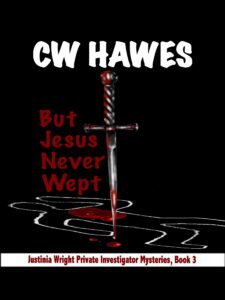With my own contribution to the Magnolia Bluff Crime Chronicles, Death Wears A Crimson Hat, leading the way as the top sales getter of any book in my oeuvre since its publication in April, I thought I’d give a shoutout to my own Justinia Wright mystery series.
It is obvious readers enjoy mysteries, if sales of the Magnolia Bluff Crime Chronicles is any indicator.
So, if you have read Death Wears A Crimson Hat and/or any of the other books in the Magnolia Bluff Crime Chronicles, then I encourage you to take a trip to Minneapolis, Minnesota and spend some time with Tina and Harry Wright.
The Justinia Wright Private Investigator Mysteries are classic whodunits just like many of the Magnolia Bluff stories.
If you enjoyed the sleuthing of Harry and Ember, or Graham Huston, or Caroline McCluskey, then you will enjoy the escapades of Tina and Harry Wright.
Each Justinia Wright mystery is a standalone. But since there are overarching character arcs, you may want to start at the beginning with Festival Of Death.
Or you might start with one of my favorites: But Jesus Never Wept.
Before I tell you why I like the book, let me share with you two reviews.
From Mark Scott Piper:
Great Characters, a Complex Plot, and Plenty of Surprises
But Jesus Never Wept is the third book in CW Hawes’s Justinia Wright Investigator Mysteries series. You don’t need to have read the first two to understand the characters and their steady and unsteady relationships. This one is a good read all on its own.
The title implies the focus of the novel may be about exploring the basic tenants of Christianity, but it’s not. Yes, there is an ongoing dialogue between the characters about whether Jesus ever existed in physical form, but this issue doesn’t carry the novel. In fact, the question of faith works more as a metaphor for examining and trying to understand what’s real and what’s not with the gory crimes and relentless criminals the characters must face. Like life, there are always questions here. And not all of them are answered by the end of the book.
The plot is at once intriguing and complex, and Hawes seamlessly mixes the basic murder investigation with an unexpected profusion of other themes and references including, the basics of the Christian religion, family dynamics, love relationships, high-end online prostitution, and the wrath and violence of the Yakuza crime syndicate. Not an easy task, but Hawes pulls it off with aplomb. And by telling the tale from Harry Wright’s point of view, Hawes provides some humor, even occasional sarcasm to the narrative. A nice touch, especially given the gruesome murders and constant threats from powerful enemies.
Hawes’s characters are memorable but never “average.” Justinia, Harry, Bea, and Cal all have their quirks and unique abilities. The relationships between all four have been established before in the series, and we can assume they develop further in this one. Even the minor characters and victims prove to be much more complex than they seem. I would be remiss if I didn’t mention the bone-chilling weather in Minnesota. Dealing with the ice, snow, and painfully low temperatures colors the action and the attitude of the characters in the book.
The descriptions of the weather also help pull the reader into the novel, even those of us who’ve never been to Minnesota. That’s also true of the detailed descriptions of the many meals Justinia, Harry, and Bea share. Harry is a gourmet cook, and you’ll often feel the compelling desire to sit down with them and get a taste or two of his latest culinary delight.
Jesus Never Wept is a good read, and the skill and insights of Hawes turn the standard murder mystery plot into something more—and something better. Highly recommended.
And from Joseph A Congel:
Another GREAT, 5 STAR read! This series just keeps getting better!
This is the third book in the Justinia Wright Private Investigator series, and it is a top-notch addition to a top-notch series, written by a top-notch author. If you’ve been following the brother/sister PI team, you already know this series is rich in storyline and character development. If you are discovering the Wrights for the first time in this book, you will not be disappointed. However, treat yourself, and go back and read the first two books in this wonderful series.
In this installment, the author mixes religion, the Japanese mob, and high-end prostitution, and wraps it all up in a very engaging murder mystery. But what truly drives this story is the relationship between the main characters – Justinia, Harry, Bea, and Cal. The subplot of their lives is intertwined masterfully with the main plotline of the book, which is the mystery that needs to be solved. And although the idea of an intriguing mystery may have brought you here, the well thought-out, fun, realistic, characters is what will bring you back for more. A great murder mystery will make a great book, but a deeply developed cast of reoccurring characters is what makes a great series… and this is a great series.
I loved the first two books, and this one is no different. It’s why I bought the whole series. I look forward to seeing what the Wrights get themselves into between the pages of the next book. But don’t take my word for it, try them for yourself – just don’t be surprised if you become addicted.
Reviews like those two, really lift a writer. They are a light to illuminate the dark days that touch every storyteller.
So why do I like But Jesus Never Wept? I love the characters.
If I do not like the characters, then the book, movie, TV series, short story, or stage play are dead to me. It is as simple as that. I am there for the characters. And I love Tina and Harry. They are my children.
Characters aside, I also like the storyline in this novel. It touches on religion, something important in my life. The story also asks us what is of importance in our short lives. What’s life all about? Is love the answer? Or is it something else? Or maybe there is no answer.
As both Raymond Chandler and Erle Stanley Gardner noted, the murder mystery is the simplest of stories.
A kills B. The police think the killer is C, until the sleuth shows them the perpetrator is A.
The task of the writer is to use style to turn a very simple story into one that is not only complex, but beautifully satisfying; perhaps even elegant.
I think But Jesus Never Wept is a cut above. And I ask you to give it a try. Pick it up at Amazon.
Comments are always welcome! And until next time, happy reading!
 CW Hawes is a playwright, award-winning poet, and a fictioneer, with a bestselling novel. He’s also an armchair philosopher, political theorist, social commentator, and traveler. He loves a good cup of tea and agrees that everything’s better with pizza.
CW Hawes is a playwright, award-winning poet, and a fictioneer, with a bestselling novel. He’s also an armchair philosopher, political theorist, social commentator, and traveler. He loves a good cup of tea and agrees that everything’s better with pizza.
If you enjoyed this post, please consider buying me a cup of tea. Thanks! PayPal.me/CWHawes
Share This!